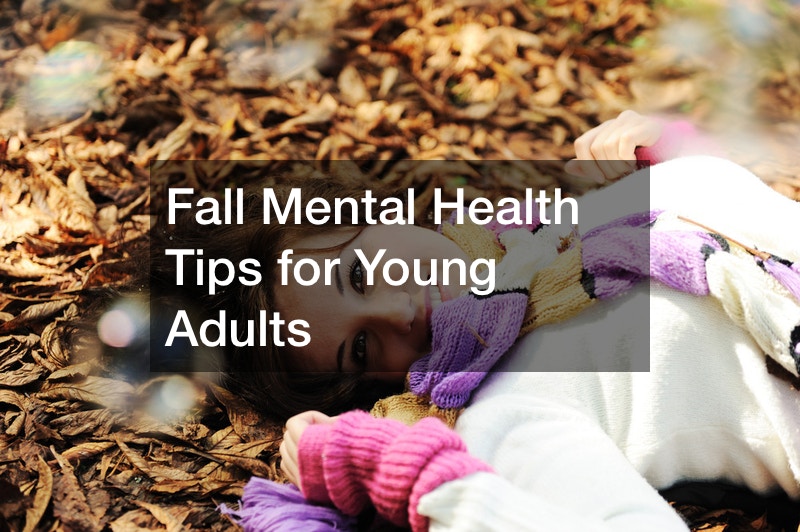
While most people associate mental health with the dark, cold winter days, it is important to remember that fall can also be stressful. With the back-to-school season in full swing, young adults are likely overwhelmed with homework and extracurricular activities. The pace of life tends to pick up during this time of year, with students juggling classes and jobs on top of social lives. It is easy for young adults to feel overwhelmed at this time of year.
The problem with fall mental health is not solely sped up; seasons also bring its issues. There is a reason why we tend to get “the autumn blues.” Even though we may not suffer from seasonal affective disorder, the shorter days and changing colors of the leaves can still affect our mood. Keep this in mind as you read through these fall mental health tips for young adults.
Practice Mindfulness

One of the fall mental health tips is, if you are suffering from a mental health problem, it will help if you are considerate of the moment. You should learn how to breathe correctly and think calmly about what is happening around you without freaking out. Make an effort to walk around more, listen to calming music, or practice meditation. All these activities will bring a sense of peace within yourself and aid in keeping a healthy mind.
Another factor in the list of important fall mental health tips is practicing mindfulness regularly by slowing down, appreciating what is happening right now, focusing on the present instead of worrying about the future, and being aware of nutritional needs.
Being mindful is all about being present in the moment. It may not be easy to practice this if your attention is constantly being drawn elsewhere. However, it is possible to learn how to separate yourself from distractions and become fully engaged with what you are doing at any given moment. You may not realize it, but practicing mindfulness can help you decrease feelings of stress, which brings us to tip number two.
You should also be mindful of other people: endeavor to put yourself in somebody else’s shoes before making any snap judgments. Try seeing things from other people’s perspectives, especially those who may seem different from what you do. Be mindful of others by taking time out of your day to ask how they are doing. This not only helps you learn more about the people in your life, but it also allows them to know that you care.
Be Practical
Sometimes we focus so much on what we want out of life that we forget about reality and how difficult it can be to achieve our goals (not to mention dreams). Instead of getting overwhelmed by what you perceive as an obstacle, solve problems one step at a time and take small steps towards achieving long-term goals before the end of the fall season arrives.
Ironically, we live in a world where relaxation seems almost impossible, yet we spend so much of our time trying to find it. Whether you relax by listening to music while on your Amish furniture, watching television, taking long walks, or meditating, schedule some ‘you time’ into your life and learn how to relax.
If talking about your problems makes you uncomfortable, there are several other options for fall mental health tips you can choose from. Reading a book in the sunrooms can be a great way to escape from everyday life. Pick up something that sparks your interest and immerse yourself in another world. Reading is also a great way to exercise your brain as it provides new knowledge to enter the mind. For those who have been feeling down lately, reading is one of the fall mental health tips that can change your life!
Find Something You Love Doing

One helpful fall mental health tip is learning something new for yourself, whether it is a musical instrument, cooking delicious dishes, or learning how to do super-cool DIY projects, such as custom screen printing on t-shirts, painting, or learning how to make embroidered apparel. These activities will help you concentrate on something else.
Suppose you cannot think of anything to look forward to — no worries. There are always things that you can look forward to, even if they are not tangible. For example, if it is the beginning of September and your favorite football team is not scheduled to play until November (and they usually win,) you have something to look forward to! Remind yourself of these things often and avoid getting caught up in negative thinking.
Try and find out what your passion is: if you do not know what you like doing most in the world, consider taking some time to figure out what makes you feel completely fulfilled in every way possible. You would be surprised by the number of activities that can make us feel whole and alive!
Hobbies can also serve as an effective coping mechanism and is one of the best fall mental health tips for young adults struggling with certain mental illnesses such as anxiety and depression. Engaging in your favorite pastime is an excellent way to take some time out of the day for yourself, relax, and think about something other than all the things that are stressing you out.
Joining new clubs and social groups in your community or neighborhood can be beneficial because you will get to meet new people who share similar interests, which will help strengthen existing friendships while making new ones at the same time. Participate in holiday activities such as decorating your home, obtaining hot tub repair for ultimate relaxation, and scheduling residential electrical services to install a new device or two in your room or home that’ll help you maintain your mental health when it’s too cold to go outside. You can also volunteer at a local shelter or soup kitchen, attend religious services, and spend time with others who share similar beliefs by giving gifts and decorating cookies together.
Start Talking to Your Friends About Your Mental Health
This is one of the most important fall mental health tips for young adults. Keeping all stressors locked up inside will only make them pile up, which can cause health concerns, lack of sleep, etc. One way to manage mental strain is talking about whatever is bothering you with others – friends, family members, etc. It is essential to keep communication open so that no one feels left out or alone in their struggles!
Express yourself through admitting that you have a problem can be pretty tricky at first. But being open about your struggle with the people around you will help you get through it. You do not need to tell everyone about your condition. Just choose the right people who understand you best and share it with them freely. Also, the more you talk about it, the more comfortable you will become with your condition.
Sometimes we hold back on expressing how we truly feel for fear of being judged or uncomfortable: this is never good for mental health! It is important to take the time to express thoughts and feelings, to let go of emotions weighing us down.
Many young adults are hesitant to reach out and talk to others about their mental illness because they think they will be seen as different or weak. More than likely, you are not alone, and there is someone out there willing to listen if only you ask them! However, by not confiding in someone you trust, you could be putting yourself at risk of a serious crisis down the road. Talking with trusted friends and family members can help provide insight into coping with your mental illness and offer support when most needed.
Eat Healthy Meals

There are some fall mental health tips that are overlooked. One of them is being aware of what you are eating. Certain foods can exacerbate mental health conditions. Therefore, you should avoid sugary and starchy snacks; if you are craving something sweet, opt for fruit or dark chocolate instead. Try to eat more vegetables and lean meats, as these provide us with essential vitamins and nutrients that we need to function correctly.
It is easy to have a hectic lifestyle and not have much time to prepare meals or even stop for a snack. However, what you eat can have a significant impact on your physical health and your mental health. Eating junk food constantly can lead to weight gain, while eating healthy foods such as whole grains, fruits and vegetables can help give your body the nutrients it needs to protect itself against various conditions that might affect you. Also, try drinking more water throughout the day since your body needs proper hydration to function properly.
Make Time for Yourself
One of the key fall mental health tips is that it is important for everyone to make some ‘me’ time to relax and gain energy back after a long week at work or school. Maybe you enjoy cooking, playing sports, watching movies, or undertaking facial care practices. Figure out what works best for you, and then schedule it into your everyday routine!
Ensure that you make time to find out what makes you unique. Everyone has strengths that they bring to the table. Some people might be good with numbers, while others are great with animals; whatever makes you unique is probably something that will help you in the future, so try not to ignore it.
One of the best fall mental health tips is to find out what helps you relax. Everyone has their way of relaxing. For some, it is going for a walk or going to the gym: others might find talking with friends calming. Whatever it may be, make sure your ‘go-to’ keeps your stress levels. You should try and do something creative every day. For instance, art therapy can be an effective tool for managing mental health issues by expressing emotions through drawing or painting, writing short stories, etc. This is a great way to feel comfortable with oneself and manage stress without medication or other treatments that could bring about adverse side effects.
Live a Balanced Lifestyle

Eating right and exercising is one of the fall mental health tips proven to reduce stress levels. A balanced diet should help with this. Make sure that you are eating enough but not too much. Include some cardiovascular exercises in your schedule as well, such as jogging or biking — whatever works best for you. You should try exercising regularly, whether this means going for a morning run, doing yoga in your bedroom, or just taking a walk around the block. Physical activity will make you feel tired and reduce the stress of your day by releasing endorphins (which are like a natural antidepressant). It’s also important to visit your doctor annually for check-ups and to obtain vaccines — don’t take your healthcare for granted!
It is also essential to be aware of how much sleep you need. Our bodies require adequate rest, so try to get at least eight hours of sleep every night. When we dream, our brains are busy processing all the information we acquire during the day. You will feel better and more energized if you limit your exposure to screens at least an hour before going to bed. Not getting enough sleep can cause mental strain and physical effects such as high blood pressure and weight gain. The amount of sleep people need varies from individual to individual, so figure out what works best for you and stick with that number: this could mean sleeping in on weekends if someone feels they need more rest than usual!
Another example of fall mental health tips that is easily overlooked is keeping your relationships in check. If you tend to drag friends and family into your problems or try to help them too much, it could be harmful to your mental wellbeing. Everyone has their own lives they need to live, so let them do that while still maintaining close friendships with them individually rather than in group activities.
Ask for Help When You Need It

Seeking assistance from a mental health counselor or therapist can be of great assistance in getting better. It is okay to ask for help by consulting a professional when you have trouble coping with a mental health condition. This person is trained to help people, and they will know how to give you an exercise program or treatment plan designed specifically for you and your needs. They can also educate and support family and friends and provide resources for dealing with mental illnesses.
Young adults are at a specific high risk for mental health concerns. They are often experiencing new life stressors, working full time, dealing with romantic partners, adapting to new environments, and managing finances. These challenges can cause anxiety or depression if not dealt with. Do not always be drawn to your laptop, smartphone, listening to car audio, or TV screen when you are free. It is okay if you want to take a day off from taking selfies or posting statuses on social media once in a while because other activities will divert your attention away from being glued to the Internet. Get out with friends and enjoy your life!



